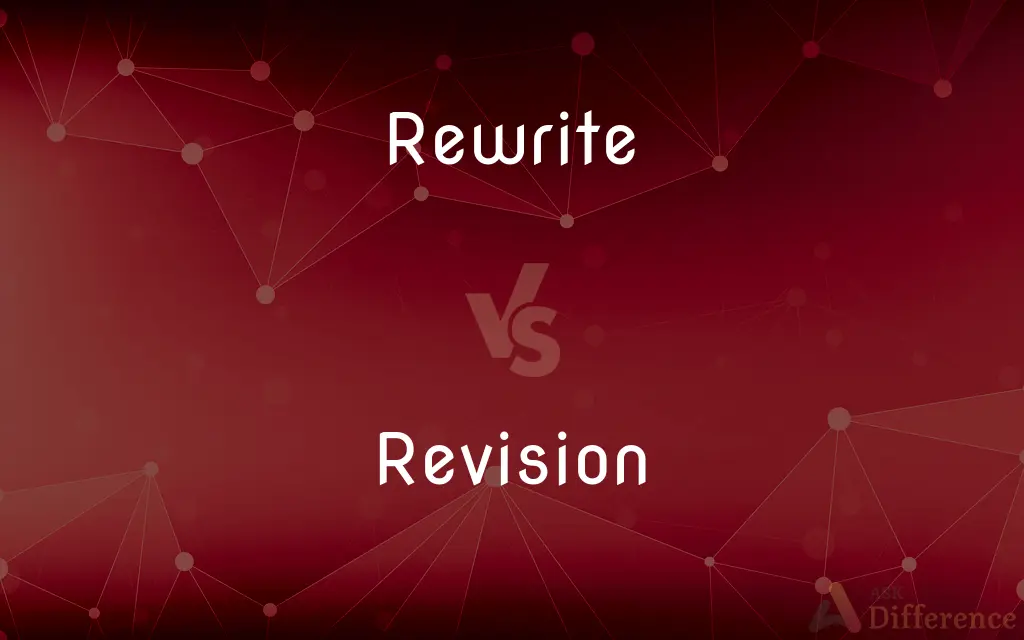Rewrite vs. Revision — What's the Difference?
By Fiza Rafique & Maham Liaqat — Updated on April 4, 2024
Rewrite involves substantial changes to a text's content or structure, while revision focuses on improving clarity, coherence, and style without drastic alterations.

Difference Between Rewrite and Revision
Table of Contents
ADVERTISEMENT
Key Differences
A rewrite entails significant modifications to a document or text, potentially altering its initial direction, structure, or main points. This process might involve reworking large portions of the text, changing the narrative voice, or shifting the focus entirely to better serve the intended purpose or audience. In contrast, a revision is more about refining and improving a text without fundamentally changing its essence or main arguments. It involves correcting errors, enhancing word choice, and ensuring consistency and clarity throughout the document.
When rewriting, the writer often reconsiders the text's overall organization, reimagines the approach to the topic, or even changes the thesis or key arguments. This can lead to drafting new sections, removing irrelevant parts, or incorporating additional research. On the other hand, revision typically sees the writer working within the existing framework of the text, focusing on making it clearer, more compelling, and more coherent by adjusting language, fixing grammatical errors, and improving transitions.
Rewriting can be likened to demolishing and reconstructing parts of a building to better meet the needs of its occupants, whereas revising is akin to making cosmetic and functional improvements to the existing structure to enhance its appeal and usability. Rewrites are often necessary when the foundational elements of a text are misaligned with its objectives, requiring a more drastic intervention to achieve its goals. In contrast, revisions are suitable for texts that are fundamentally sound but need polishing to shine.
The decision to rewrite or revise depends on the initial quality of the document and the extent of the changes needed to fulfill its purpose. Rewriting is a more time-consuming and labor-intensive process, often undertaken when the writer or reviewer determines that the text is not effective in its current form. Revision, while also requiring careful thought and attention, is generally a less daunting task, aimed at refining and enhancing a work that is already on the right track.
Both rewriting and revision are crucial steps in the writing process, serving different needs. A successful writer recognizes the value of both, understanding when a piece requires a fresh start through rewriting or can reach its potential with thoughtful revision. Balancing these approaches allows for the creation of compelling, clear, and effective texts.
ADVERTISEMENT
Comparison Chart
Purpose
To fundamentally change content or structure
To improve clarity, coherence, and style
Scope
Major changes, including altering direction or focus
Minor adjustments, focusing on refinement
Process
May involve reorganizing, adding, or deleting significant portions
Primarily involves editing within the existing framework
Outcome
A text that may differ substantially from the original
An enhanced version of the original text
When Used
When the text fails to meet objectives in its current form
When the text is generally sound but could be improved
Compare with Definitions
Rewrite
A version of a text after significant modifications.
The final manuscript was a rewrite that barely resembled the first draft.
Revision
The act of revising; making changes to improve a text.
The document went through several rounds of revision before publication.
Rewrite
To write something again so as to alter or improve it.
The author decided to rewrite the novel to better align with the target audience's expectations.
Revision
Enhancing a text's clarity, coherence, and overall quality.
Through revision, the writer improved the flow and readability of the essay.
Rewrite
The act of making substantial changes to a text.
The rewrite included changing the story's setting and main characters.
Revision
The final step before a text is considered complete.
After the last revision, the book was ready for printing.
Rewrite
Starting over with the intention of changing the original content or structure.
After feedback, the screenplay underwent a complete rewrite.
Revision
Corrections and improvements without drastic changes.
The revision process focused on clarifying complex arguments.
Rewrite
The process of reimagining a work's direction.
The article's rewrite focused on a different angle to engage readers more effectively.
Revision
Editing that refines a work's language and structure.
The editor's revision suggestions greatly enhanced the article's impact.
Rewrite
To write again, especially in a different or improved form; revise.
Revision
The action of revising
The scheme needs drastic revision
Rewrite
To put (material submitted to a newspaper or magazine) in a form suitable for publishing.
Revision
The act or process of revising.
Rewrite
(Computers) To save (a usually altered file) over its most recent version in the same storage location.
Revision
A revised or new version, as of a book or other written material.
Rewrite
To make revisions in written material.
Revision
(uncountable) The process of revising:
Rewrite
The act or an instance of rewriting.
Revision
The action or process of reviewing, editing and amending.
Rewrite
Something rewritten.
Revision
The action or process of reviewing something previously learned, especially one′s notes in preparation for a test or examination.
All that last minute revision really paid off in the exam! I got top marks!
Rewrite
The act of writing again or anew.
The film script underwent a rewrite for the European market.
Revision
(countable) A changed edition, or new version; a modification.
Rewrite
Something that has been written again.
Revision
(countable) A story corrected or expanded by a writer commissioned by the original author.
A revision story
Rewrite
(transitive) To write again, differently; to modify (a piece of writing or music, etc.).
The editor asked me to rewrite my article for a non-technical audience.
Revision
To provide with a new vision.
What philosophy needs is to be revisioned with a more hopeful, engaged inspirational point of view.
Rewrite
(transitive) To write out again (without changes).
Revision
The act of revising; reëxamination for correction; review; as, the revision of a book or writing, or of a proof sheet; a revision of statutes.
Rewrite
To write again.
Revision
That which is made by revising.
Rewrite
Something that has been written again;
The rewrite was much better
Revision
The act of revising or altering (involving reconsideration and modification);
It would require a drastic revision of his opinion
Rewrite
Write differently; alter the writing of;
The student rewrote his thesis
Revision
The act of rewriting something
Rewrite
Rewrite so as to make fit to suit a new or different purpose;
Re-write a play for use in schools
Revision
Something that has been written again;
The rewrite was much better
Common Curiosities
Can a revision turn into a rewrite?
Yes, if during the revision process it becomes clear that minor adjustments are insufficient to achieve the desired improvements, a more extensive rewrite may be necessary.
How do I know if my work needs a rewrite or a revision?
Assess if the core message, structure, and objectives of your work align with your goals. If they do not, consider a rewrite. If the foundation is solid but could be enhanced, opt for revision.
Can both processes be part of the same writing project?
Yes, a writing project can undergo both a rewrite and subsequent revisions, especially in complex or lengthy works.
Is one process better than the other?
Neither process is inherently better; the choice depends on the specific needs of the text and what you aim to accomplish through adjustments.
Do professional writers often rewrite their work?
Yes, professional writers frequently engage in both rewriting and revising as part of their process to refine their work and meet their audience's expectations.
How do rewrites and revisions contribute to the quality of a final text?
Both processes are essential for refining a text, addressing its weaknesses, and enhancing its strengths, ultimately contributing to a more polished, compelling, and effective final product.
Is it common to rewrite or revise based on personal judgment alone?
While personal judgment plays a significant role, seeking external feedback can provide valuable perspectives that inform whether a rewrite or revision is necessary.
What is the main difference between a rewrite and a revision?
A rewrite involves substantial changes to the content or structure, while a revision focuses on refining and improving the text's clarity, coherence, and style.
When should I choose to rewrite rather than revise?
Choose to rewrite when the text significantly fails to meet its objectives or requires major changes to its direction, focus, or structure.
How does feedback influence the decision to rewrite or revise?
Feedback can highlight areas of confusion, lack of clarity, or disinterest, guiding the writer towards choosing between rewriting for substantial changes or revising for improvements.
Share Your Discovery

Previous Comparison
Alcohol vs. Ammonia
Next Comparison
Rote vs. RoeAuthor Spotlight
Written by
Fiza RafiqueFiza Rafique is a skilled content writer at AskDifference.com, where she meticulously refines and enhances written pieces. Drawing from her vast editorial expertise, Fiza ensures clarity, accuracy, and precision in every article. Passionate about language, she continually seeks to elevate the quality of content for readers worldwide.
Co-written by
Maham Liaqat











































